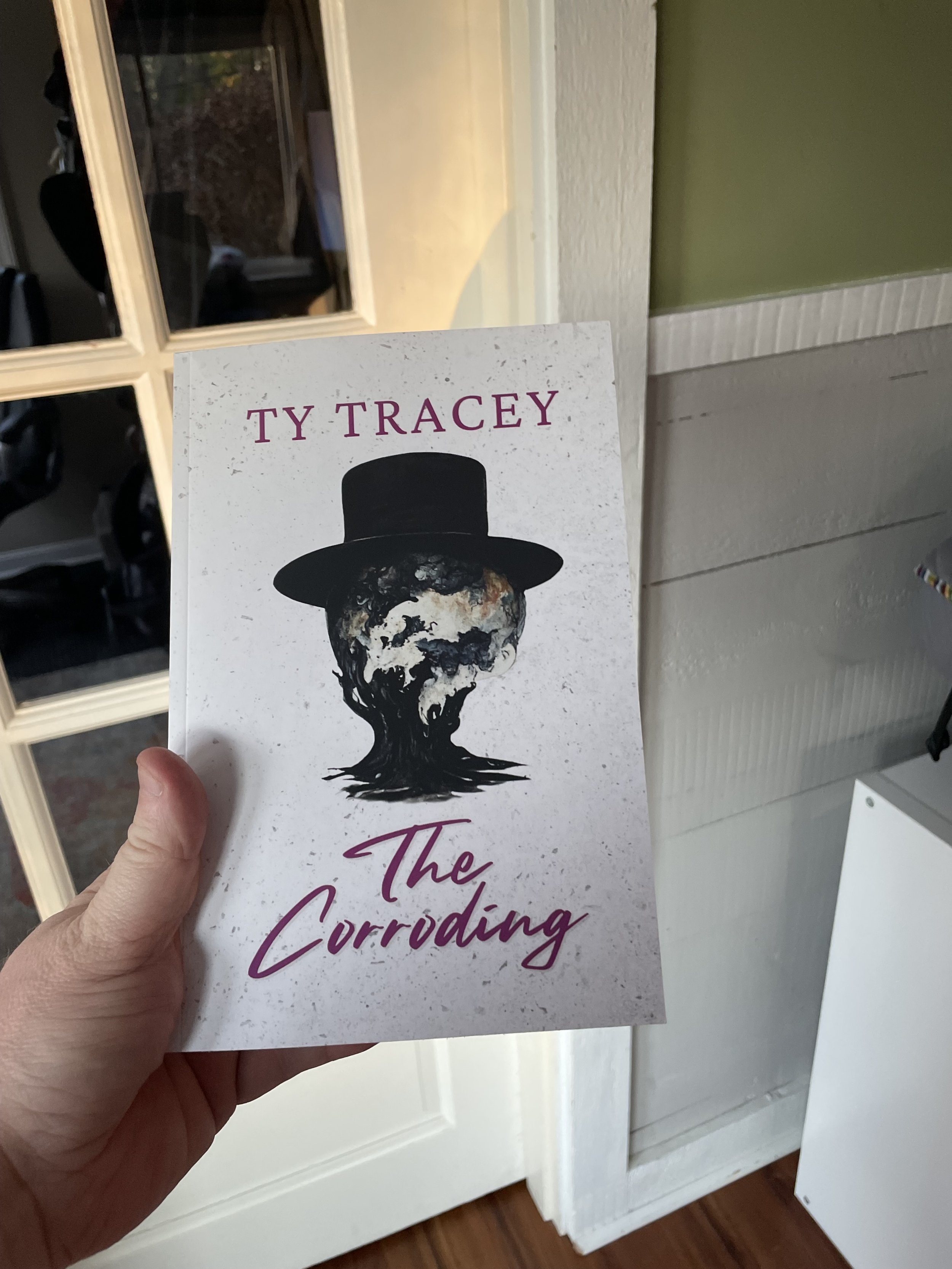One of the questions I get asked a lot as an author of horror is: "Ty, where do you come up with this stuff?" Some such queries are less passive-aggressive than others. More often than not, it sounds more like people asking me: "Ty, what in the unholy hell is wrong with you? Are you crazy?" I'll have you know that I've never been diagnosed with anything "wrong with me." Besides maybe the occasional bout of strep throat and a litany of broken bones in my younger, clumsier years.
Mentally, I fancy myself a relatively stable unit. Do I get angry from time to time? Absolutely, I'm originally from Cleveland and still root for the Browns. So I am forever doomed to suffer from those annual frustrations like a never-treated developmental disability passed down from a long line of also-frustrated decedents before me.
Does my mind wander in the direction of the strange and haunted? Probably more so than most people, but writing about such things is, after all, what I do. I'm sure the people who clean up dead animals from the side of roads spend much more time thinking about roadkill than the average human. Does that make them crazy? Maybe a little, but probably no more than anybody else.
I've never fully embraced social media. I've also never been the kind of person who seeks others out as outlets for complaining about shit. I'm never going to call you on the phone at eleven at night and bitch about life, politics, or the socioeconomic climate within which our zeitgeist is currently overlaid. If I've got something on my chest, it stays there until I write about it. Wrapping paranormal narratives around what vexes me gives me ideas for my stories. The Corroding is, far and away, my most significant example of this practice to date.
In short, the world spent the four years since I published Three Days in Ashford pissing me off. This was the era of a completely preventable financial meltdown. The age of a never-ending parade of the biggest bunch of non-lucid dickheads you could possibly stuff a microphone in front of to allow them to beg you for votes. A time where any and all progress we've made as a species over centuries would become shattered at the behest of greed and stupidity masquerading as righteousness. All set against a horrifying backdrop of a global pandemic that continues choking millions of our friends and family members to death.
As someone like myself who bottles up his stressors, there's still a critical mass of bullshit I'm capable of pressing down into my locked-away place. This tact is designed to perform optimally under normal circumstances. However, the years between 2018 - Present have been anything but ordinary. An outlet was needed - my locked-away places were bursting at their seams. I either wrote about what vexed me, or such things would start manifesting physically and emotionally. And that would have just been flat-out counterproductive for all involved.
All the while, I had been debating what novel to write next. I was bounding back and forth in three very different directions in my head. Should I write the much-anticipated sequel to Three Days in Ashford? But I wanted to expand my writing style out of first-person, present-tense. Should I write my plotted novel: The Black Trees? One that my wife and I thought up entirely out of the blue one afternoon while walking our dog around a defunct and creepy military base? While that book will be amazing, I needed something more epic. I'd been on a kick of reading the Lovecraftian and Orwellian. I've selfishly always wanted to write for a mythos. This gave me a third direction to pursue - the great dystopian epic. And it ultimately won, becoming The Corroding. It was an incredibly ambitious venture, and I see that more now that it's done than when I initially took it on. You have to get into the middle of something as epic as The Corroding before arriving upon a lot of: "What in the hell did I get myself into?" moments.
As I began plotting out The Corroding, I found myself, almost subconsciously, inserting elements around the day's frustrations - those things that had long vexed me. It wasn't until I was halfway through plotting it out that I realized I was writing an allegory. And I wasn't writing an allegory because I wanted to; I was writing an allegory because I needed to. I found myself writing The Corroding with an intensity I've never experienced because it became a therapeutic effort on my part. I was finally releasing everything I had locked away onto page after page, paragraph after paragraph, sentence after sentence.
I allowed Allister Smoke to become the manifestation of everything wrong. I allowed Lori Cruz and Larry Kleve to become everything I'd ever hoped might kill him. I then wrapped that general idea into something that represented (a highly dramatized) version of our current snapshot in time as a civilization. What if I gave all of our problems a face? What if all our socioeconomic and geopolitical screw-ups, all our health, equality, and social crises were given a name? What would it take to survive such an entity? What would it take to defeat such an enemy?
And so The Corroding was birthed. An allegory for our life and times. A condemned civilization fighting against its own history. A meditation into what brought us to such dire straits. A struggle to escape the shadow cast by our own collective darkness.
People also tend to ask me: "Ty, what is The Corroding about?" It's about a lot of things. Firstly, it is a terrifying novel - I generally tend to lean toward the paranormal in my writing, but not this time. The Corroding was written to deprive its readers of sleep.
Above all else, The Corroding is a love story. It's a celebration of the miracle that each and every last one of us represents. Not one of us would be here if countless stars hadn't exploded in perfect order over billions of years. Had a rogue planet not slammed into Jupiter billions of years ago, knocking it away from our orbit around the sun, our world would've never existed. Had another planet never slammed into us and reassembled into orbit around the Earth as our moon, life would've struggled to come about amongst tide-less oceans and wildly unpredictable seasonal shifts.
Many look for divine intervention through ancient literature. Yet the miracle that brought us into existence is easily found by analyzing the mathematically impossible chain of events that have occurred since the Big Bang. All of which had to happen in perfect order for even those we despise the most to exist at all. It's not other human beings we tend to fall into traps against. All the bullshit we've created around ourselves over thousands of years built the traps we keep falling into.
Human beings are an inherently tribal species. Every idea we've come up with to govern ourselves or explain our existence was targeted at those who think and look like whoever wrote it. All policy is written to benefit the tribe and no one else. Then we decided to globalize without, for a moment, considering aligning our tribal policies with others. This, not unlike a group of children debating who their favorite Avenger is, inevitably led to conflict.
We've long since forgotten what it truly means to be human. To be, for all we know, the only sentient species anywhere in the cosmos. To be stuck on the same tiny rock, spinning around a lonely star, somewhere in the endless expanse of our universe. To embrace our small part in something infinitely more profound than any human-conceived dogma or policy.
You are here . . .
The Corroding explores our significance beyond all we've dubiously conjured over millennia to control one other. It's a forced reckoning to atone for a sin taken entirely too far for entirely too long. We must get ourselves back to a place as a species where we can fight alongside one another despite our differences. A place where we can weed out the prisoners from the imprisoners and rise from our marginalized cages. And take back our civilization, our world, from those destroying it for their own deviant ends. But first, we must remember that who we all are, what we all are, is far more critical than anything conceived by a small, biased collection of ourselves. Only then might we win. Only then might we survive The Corroding.
Ty Tracey






